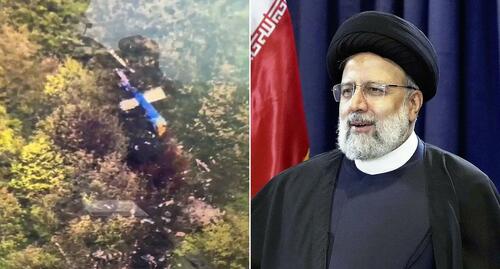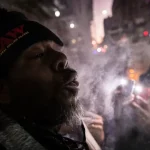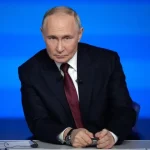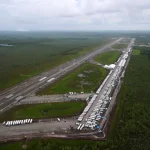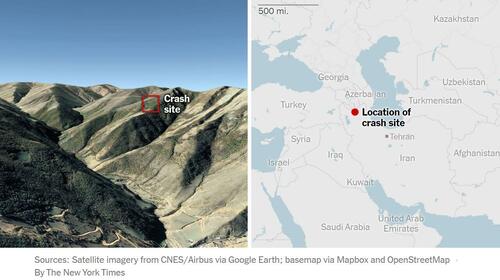
Update(1437ET): More details have emerge of the helicopter crash in remote far northern Iran on Sunday which killed President Ebrahim Raisi and some top officials. Iranian state media is citing a "technical failure" which caused the helicopter to crash in the site of a mountain not far from the border of Azerbaijan. Iran state media has also blamed US-led sanctions which have heavily targeted its aviation sector for years. The Bell helicopter transporting the Iranian head of state was reportedly at least 40 years old, but there was also inclement weather and heavy fog in the region over the weekend.
State funerals are being planned, reportedly which will take place over three cities in as many days, which will include public processions. Heads of state allied with Iran are expected to attend, and it will be interesting to see whether Russia's Putin and China's Xi will be attending in Tehran. As for the White House, it has released the following message via John Kirby: he offered the government’s "condolences" for the death of President Raisi, but he said "we’re going to continue to stand with the Iranian people as they fight for their own civil rights and, as they should, and we’re going to continue to hold Iran accountable for all their destabilizing behavior in the region, which continues to this day."
Kirby also emphasized that the Iranian leader had "a lot of blood on his hands" as he was responsible for "atrocious human rights in his own country." The White House further said he had long supported "terrorist networks throughout the region." Meanwhile, an interesting scene in Tehran:
A new poster has been placed at Vali Square in Tehran with the caption: "When Ebrahim met Qasem." pic.twitter.com/EyEc4fiyxa
— Russian Market (@runews) May 20, 2024
The New York Times has published the following graphic:
As for the claim that US-led sanctions had something to do with this, Al Jazeera explains that things dramatically worsened for aviation repair in the Islamic Republic since then President Trump pulled out of the JCPOA nuclear deal in 2018:
The frequent need for repairs has raised plane ticket prices in Iran, and has also placed economic strain on smaller aircraft companies. Aircraft also can not be sent abroad for repair and have to be repaired locally, with limited expert manpower, Mohammad Mohammadi-Bakhsh, the head of Iran’s aviation agency, the Civil Aviation Organization of Iran (CAO), told Fars news agency in 2022.
In 2015, the Iran nuclear deal called the Joint Comprehensive Plan Of Action (JCPOA) was signed. In it, Iran agreed to halt the production of materials that could be used in manufacturing nuclear weapons. In return, sanctions on its aviation sector were relaxed, enabling it to buy aircraft from foreign manufacturers such as Airbus and Boeing.
The New York Times also writes:
On Monday, Iran’s former foreign minister, Mohammad Javad Zarif, said that by imposing sanctions on the country’s aviation industry, the United States was responsible for the crash. His comments were carried by the official Iranian news agency, IRNA.
Sanam Vakil, a Middle East expert at Chatham House, a research group based in London, said that Iran’s aviation sector has long suffered under sanctions.
“Iran has seen a lot of airline incidents, not just helicopter but airplane crashes, and I think this is definitely tied to sanctions,” she said.
US Secretary of Defense Lloyd Austin has stated firmly on Monday that the United States had nothing to do with it.
* * *
Following Tehran's early Monday confirmation of the deaths of Iranian President Ebrahim Raisi, 63, along with Foreign Minister Hossein Amir-Abdollahian, and other officials after their helicopter went down over mountainous terrain near the border with Azerbaijan, Iran’s supreme leader Ayatollah Ali Khamenei has named a new acting president of the Islamic Republic.
Vice President Mohammad Mokhber has assume interim duties in the wake of Raisi's death. Additionally, Iran’s nuclear negotiator, Ali Bagheri, has been named acting foreign minister. This follows a Sunday statement by Khamenei assuring the public that there would be continuity and stability in the nation's leadership. Iranians have taken to the streets in what's expected to be several days of a national mourning period.
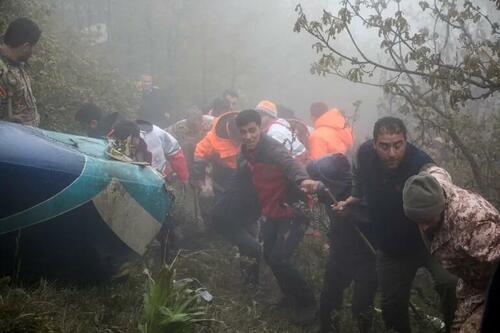
Bodies of the deceased were hiked out of the remote region of the crash. They had to be physically carried on stretchers by rescuers who spent hours reaching the site amid difficult Sunday and overnight weather conditions.
State media has since indicated that aboard the presidential helicopter were nine people in total, including body guards and clerics. Their aging Bell helicopter had reportedly "hit a mountain and disintegrated" amid high fog, low visibility conditions. This was not at all the "hard landing" the world was initially informed about Sunday via state officials and media.
Iran’s Red Crescent chief Pirhossein Koolivand has told international media that his team is "transferring the bodies of the martyrs to Tabriz" and that "the search operations have come to an end."
Very quickly, theories emerged over the question of foreign involvement or a covert plot to assassinate the Iranian head of state. Israel has been quick to deny speculation of its involvement:
On Monday, an Israeli official denied involvement in the crash, telling the Reuters news agency: "It wasn’t us."
Raisi, 63, was widely regarded as a hardliner in the country and was nicknamed the 'butcher of Tehran' over his role in sentencing thousands of Iranian prisoners to their deaths in 1988.
Iranian rescue teams now transfer the bodies of Iranian officials, including President Raisi and Foreign Minister Amir-Abdollahian, to the downstream areas from the helicopter crash site. pic.twitter.com/GZ5KqWemZP
— Clash Report (@clashreport) May 20, 2024
The Taliban and Hezbollah are among those issuing their condolences, with the latter referencing "great brother" Raisi. Russia is offering any assistance needed, and statements of mourning are pouring in from world leaders, including the following:
- Several world leaders, including Egyptian President Abdel Fattah el-Sisi, Chinese President Xi Jinping and Turkish President Recep Tayyip Erdogan, have offered their condolences
- Syria and Lebanon have declared three days of mourning following the fatal helicopter crash
- Hezbollah has issued a statement offering its “deepest condolences” to Iran’s Supreme Leader, Ali Khamenei, and the Iranian people.
- European Union foreign policy chief Josep Borrell has offered his condolences over Raisi’s death.
Already President Putin has spoken directly by phone to Iran's interim President Mokhber. The Kremlin said in the call the Russian leader emphasized "mutual intention to further strengthen Russian-Iranian interaction."
Below is some summary background information on the newly appointed Iranian leader Mokhber:
Despite his low-key public profile, Mokhber has held prominent positions with in the country’s power structure, particularly in its bonyads, or charitable foundations. Those groups were fueled by donations or assets seized after Iran’s 1979 Islamic Revolution, particularly those previously associated with Iran’s shah or those in his government.
Mokhber oversaw a bonyad known in English as the Execution of Imam Khomeini’s Order, or EIKO, referring to the late Supreme Leader Ayatollah Ruhollah Khomeini.
...Mokhber previously worked in banking and telecommunications. He also worked at the Mostazafan Foundation, another bonyad that’s a major conglomerate that manages the country’s mega-projects and businesses. While there, he found himself entangled in a bitter legal dispute between mobile phone service providers Turkcell and South Africa’s MTN over potentially entering the Iranian market.
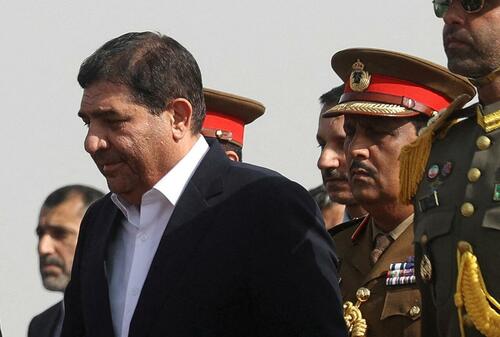
And below is a brief backgrounder on new foreign minister Ali Bagher:
- Born in 1967 in the village of Kan in northwestern Tehran, Bagheri grew up in a family deeply involved in Iranian politics.
- His father, a renowned Shia leader, was a member of the Assembly of Experts tasked with selecting the supreme leader.
- Bagheri worked in the Foreign Ministry in the 1990s and grew close to conservative figure Saeed Jalili.
- When Jalili was appointed secretary of the Supreme National Security Council and became Iran’s chief nuclear negotiator, Bagheri served as his number two.
- After Bagheri concluded his own mission at the Council, he joined the judiciary when it was headed by Raisi.
- He served as secretary of the Human Rights Council and then as assistant for international affairs.
- Weeks after Raisi took office in 2021, Bagheri was appointed deputy foreign minister for political affairs and chief nuclear negotiator. Since then, those talks have come to a standstill over seemingly insurmountable differences, particularly with the US.
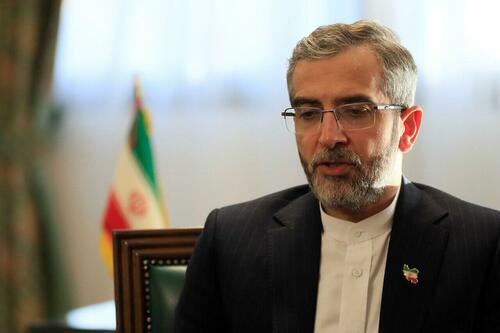
Below is a summary of the last 24 hours via Peter Tchir of Academy Securities:
- Yesterday, a helicopter carrying Iranian President Raisi crashed while he was visiting a region in northern Iran.
- After a 12-hour search, it was confirmed by Iranian state media earlier this morning that nine people including President Raisi and Iran's foreign minister, Hossein Amir-Abdollahian, were killed in the crash.
- Reportedly, at least 40 rescue teams (including drones, search dogs, and two helicopters from Russia) were utilized in the search effort, but bad weather, heavy fog, and darkness made it difficult for them to reach the site and confirm the deaths of the passengers.
- Initial indications are that the crash was weather related, but due to sanctions on Iran, many aircraft face a shortage of parts, so officials are not ruling out a maintenance issue as a reason for the crash.
- Raisi was a hardliner who was re-elected in 2021 and was viewed as a protégé of Khamenei, and a likely successor.
- Under Raisi’s leadership, Iran continued to enrich uranium to near-weapons grade levels, supplied weapons to Russia for use in its war in Ukraine, launched a (largely unsuccessful) missile and drone attack on Israel in April, and continued to support proxy forces in the Middle East including the Houthis and Hezbollah.
- Iran’s first vice president, Mohammad Mokhber, is next in line for the presidency and Khamenei announced this morning that he would serve as the country’s acting president until elections are held, which are required to happen in the next 50 days.
- Mokhber was reportedly part of the group that traveled to Moscow in 2022 to finalize the deal to send Shahed drones and surface-to-surface missiles to Russia.
For now it appears 'moderates' have temporarily replaced the 'moderate' Raisi and also deceased FM Amir-Abdollahian. The coming days will be interesting given everything happening in the Middle East, especially surrounding the Gaza war and the fact that Israel and Iran very nearly entered a full-blown war in recent months.
Update(1437ET): More details have emerge of the helicopter crash in remote far northern Iran on Sunday which killed President Ebrahim Raisi and some top officials. Iranian state media is citing a “technical failure” which caused the helicopter to crash in the site of a mountain not far from the border of Azerbaijan. Iran state media has also blamed US-led sanctions which have heavily targeted its aviation sector for years. The Bell helicopter transporting the Iranian head of state was reportedly at least 40 years old, but there was also inclement weather and heavy fog in the region over the weekend.
State funerals are being planned, reportedly which will take place over three cities in as many days, which will include public processions. Heads of state allied with Iran are expected to attend, and it will be interesting to see whether Russia’s Putin and China’s Xi will be attending in Tehran. As for the White House, it has released the following message via John Kirby: he offered the government’s “condolences” for the death of President Raisi, but he said “we’re going to continue to stand with the Iranian people as they fight for their own civil rights and, as they should, and we’re going to continue to hold Iran accountable for all their destabilizing behavior in the region, which continues to this day.”
Kirby also emphasized that the Iranian leader had “a lot of blood on his hands” as he was responsible for “atrocious human rights in his own country.” The White House further said he had long supported “terrorist networks throughout the region.” Meanwhile, an interesting scene in Tehran:
A new poster has been placed at Vali Square in Tehran with the caption: “When Ebrahim met Qasem.” pic.twitter.com/EyEc4fiyxa
— Russian Market (@runews) May 20, 2024
The New York Times has published the following graphic:
As for the claim that US-led sanctions had something to do with this, Al Jazeera explains that things dramatically worsened for aviation repair in the Islamic Republic since then President Trump pulled out of the JCPOA nuclear deal in 2018:
The frequent need for repairs has raised plane ticket prices in Iran, and has also placed economic strain on smaller aircraft companies. Aircraft also can not be sent abroad for repair and have to be repaired locally, with limited expert manpower, Mohammad Mohammadi-Bakhsh, the head of Iran’s aviation agency, the Civil Aviation Organization of Iran (CAO), told Fars news agency in 2022.
In 2015, the Iran nuclear deal called the Joint Comprehensive Plan Of Action (JCPOA) was signed. In it, Iran agreed to halt the production of materials that could be used in manufacturing nuclear weapons. In return, sanctions on its aviation sector were relaxed, enabling it to buy aircraft from foreign manufacturers such as Airbus and Boeing.
The New York Times also writes:
On Monday, Iran’s former foreign minister, Mohammad Javad Zarif, said that by imposing sanctions on the country’s aviation industry, the United States was responsible for the crash. His comments were carried by the official Iranian news agency, IRNA.
Sanam Vakil, a Middle East expert at Chatham House, a research group based in London, said that Iran’s aviation sector has long suffered under sanctions.
“Iran has seen a lot of airline incidents, not just helicopter but airplane crashes, and I think this is definitely tied to sanctions,” she said.
US Secretary of Defense Lloyd Austin has stated firmly on Monday that the United States had nothing to do with it.
* * *
Following Tehran’s early Monday confirmation of the deaths of Iranian President Ebrahim Raisi, 63, along with Foreign Minister Hossein Amir-Abdollahian, and other officials after their helicopter went down over mountainous terrain near the border with Azerbaijan, Iran’s supreme leader Ayatollah Ali Khamenei has named a new acting president of the Islamic Republic.
Vice President Mohammad Mokhber has assume interim duties in the wake of Raisi’s death. Additionally, Iran’s nuclear negotiator, Ali Bagheri, has been named acting foreign minister. This follows a Sunday statement by Khamenei assuring the public that there would be continuity and stability in the nation’s leadership. Iranians have taken to the streets in what’s expected to be several days of a national mourning period.

Bodies of the deceased were hiked out of the remote region of the crash. They had to be physically carried on stretchers by rescuers who spent hours reaching the site amid difficult Sunday and overnight weather conditions.
State media has since indicated that aboard the presidential helicopter were nine people in total, including body guards and clerics. Their aging Bell helicopter had reportedly “hit a mountain and disintegrated” amid high fog, low visibility conditions. This was not at all the “hard landing” the world was initially informed about Sunday via state officials and media.
Iran’s Red Crescent chief Pirhossein Koolivand has told international media that his team is “transferring the bodies of the martyrs to Tabriz” and that “the search operations have come to an end.”
Very quickly, theories emerged over the question of foreign involvement or a covert plot to assassinate the Iranian head of state. Israel has been quick to deny speculation of its involvement:
On Monday, an Israeli official denied involvement in the crash, telling the Reuters news agency: “It wasn’t us.”
Raisi, 63, was widely regarded as a hardliner in the country and was nicknamed the ‘butcher of Tehran’ over his role in sentencing thousands of Iranian prisoners to their deaths in 1988.
Iranian rescue teams now transfer the bodies of Iranian officials, including President Raisi and Foreign Minister Amir-Abdollahian, to the downstream areas from the helicopter crash site. pic.twitter.com/GZ5KqWemZP
— Clash Report (@clashreport) May 20, 2024
The Taliban and Hezbollah are among those issuing their condolences, with the latter referencing “great brother” Raisi. Russia is offering any assistance needed, and statements of mourning are pouring in from world leaders, including the following:
- Several world leaders, including Egyptian President Abdel Fattah el-Sisi, Chinese President Xi Jinping and Turkish President Recep Tayyip Erdogan, have offered their condolences
- Syria and Lebanon have declared three days of mourning following the fatal helicopter crash
- Hezbollah has issued a statement offering its “deepest condolences” to Iran’s Supreme Leader, Ali Khamenei, and the Iranian people.
- European Union foreign policy chief Josep Borrell has offered his condolences over Raisi’s death.
Already President Putin has spoken directly by phone to Iran’s interim President Mokhber. The Kremlin said in the call the Russian leader emphasized “mutual intention to further strengthen Russian-Iranian interaction.”
Below is some summary background information on the newly appointed Iranian leader Mokhber:
Despite his low-key public profile, Mokhber has held prominent positions with in the country’s power structure, particularly in its bonyads, or charitable foundations. Those groups were fueled by donations or assets seized after Iran’s 1979 Islamic Revolution, particularly those previously associated with Iran’s shah or those in his government.
Mokhber oversaw a bonyad known in English as the Execution of Imam Khomeini’s Order, or EIKO, referring to the late Supreme Leader Ayatollah Ruhollah Khomeini.
…Mokhber previously worked in banking and telecommunications. He also worked at the Mostazafan Foundation, another bonyad that’s a major conglomerate that manages the country’s mega-projects and businesses. While there, he found himself entangled in a bitter legal dispute between mobile phone service providers Turkcell and South Africa’s MTN over potentially entering the Iranian market.

And below is a brief backgrounder on new foreign minister Ali Bagher:
- Born in 1967 in the village of Kan in northwestern Tehran, Bagheri grew up in a family deeply involved in Iranian politics.
- His father, a renowned Shia leader, was a member of the Assembly of Experts tasked with selecting the supreme leader.
- Bagheri worked in the Foreign Ministry in the 1990s and grew close to conservative figure Saeed Jalili.
- When Jalili was appointed secretary of the Supreme National Security Council and became Iran’s chief nuclear negotiator, Bagheri served as his number two.
- After Bagheri concluded his own mission at the Council, he joined the judiciary when it was headed by Raisi.
- He served as secretary of the Human Rights Council and then as assistant for international affairs.
- Weeks after Raisi took office in 2021, Bagheri was appointed deputy foreign minister for political affairs and chief nuclear negotiator. Since then, those talks have come to a standstill over seemingly insurmountable differences, particularly with the US.

Below is a summary of the last 24 hours via Peter Tchir of Academy Securities:
- Yesterday, a helicopter carrying Iranian President Raisi crashed while he was visiting a region in northern Iran.
- After a 12-hour search, it was confirmed by Iranian state media earlier this morning that nine people including President Raisi and Iran’s foreign minister, Hossein Amir-Abdollahian, were killed in the crash.
- Reportedly, at least 40 rescue teams (including drones, search dogs, and two helicopters from Russia) were utilized in the search effort, but bad weather, heavy fog, and darkness made it difficult for them to reach the site and confirm the deaths of the passengers.
- Initial indications are that the crash was weather related, but due to sanctions on Iran, many aircraft face a shortage of parts, so officials are not ruling out a maintenance issue as a reason for the crash.
- Raisi was a hardliner who was re-elected in 2021 and was viewed as a protégé of Khamenei, and a likely successor.
- Under Raisi’s leadership, Iran continued to enrich uranium to near-weapons grade levels, supplied weapons to Russia for use in its war in Ukraine, launched a (largely unsuccessful) missile and drone attack on Israel in April, and continued to support proxy forces in the Middle East including the Houthis and Hezbollah.
- Iran’s first vice president, Mohammad Mokhber, is next in line for the presidency and Khamenei announced this morning that he would serve as the country’s acting president until elections are held, which are required to happen in the next 50 days.
- Mokhber was reportedly part of the group that traveled to Moscow in 2022 to finalize the deal to send Shahed drones and surface-to-surface missiles to Russia.
For now it appears ‘moderates’ have temporarily replaced the ‘moderate’ Raisi and also deceased FM Amir-Abdollahian. The coming days will be interesting given everything happening in the Middle East, especially surrounding the Gaza war and the fact that Israel and Iran very nearly entered a full-blown war in recent months.
Loading…
